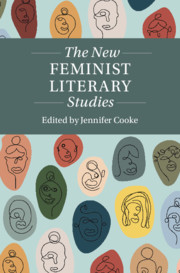Book contents
- The New Feminist Literary Studies
- Twenty-First-Century Critical Revisions
- The New Feminist Literary Studies
- Copyright page
- Contents
- Illustrations
- Contributors
- Introduction
- I Frontiers
- II Fields
- III Forms
- Chapter 11 Feminist Dwellings: Imagining the Domestic in the Twenty-first-century Literary Novel
- Chapter 12 Who Rules the World? Reimagining the Contemporary Feminist Dystopia
- Chapter 13 Transnational Feminism and the Young Adult Novel
- Chapter 14 Feminist Manuals and Manifestos in the Twenty-first Century
- Chapter 15 ‘This is not a memoir’: Feminist Writings from Life
- Chapter 16 Feminist Poetries of the Open Wound
- Bibliography
- Index
Chapter 15 - ‘This is not a memoir’: Feminist Writings from Life
from III - Forms
Published online by Cambridge University Press: 16 November 2020
- The New Feminist Literary Studies
- Twenty-First-Century Critical Revisions
- The New Feminist Literary Studies
- Copyright page
- Contents
- Illustrations
- Contributors
- Introduction
- I Frontiers
- II Fields
- III Forms
- Chapter 11 Feminist Dwellings: Imagining the Domestic in the Twenty-first-century Literary Novel
- Chapter 12 Who Rules the World? Reimagining the Contemporary Feminist Dystopia
- Chapter 13 Transnational Feminism and the Young Adult Novel
- Chapter 14 Feminist Manuals and Manifestos in the Twenty-first Century
- Chapter 15 ‘This is not a memoir’: Feminist Writings from Life
- Chapter 16 Feminist Poetries of the Open Wound
- Bibliography
- Index
Summary
This chapter considers the forms and functions of feminist writings from life in the twenty-first century, illuminating a perceived shift in the conception of the personal-as-political. Part one addresses recent feminist memoirs which seek to memorialise a period and a collective experience, thereby doing history as autobiography (Andrea Dworkin’s Heartbreak (2002) and Lynne Segal’s Making Trouble: Life and Politics (2007)); it asks how and to what ends past feminisms are narrated and remembered in the present. Part two turns to the emergence of generically inventive and autofictional forms of life writing by women in recent years. Mixing essay, fiction, theory, and autobiography, texts such as Kate Zambreno’s Heroines (2012) and Chris Kraus’s Aliens and Anorexia (2000) displace the writing ‘I’ via the incorporation and assimilation of various other life stories. I assess the possibilities and limitations of this embrace of empathetic intersubjectivity as an ethical strategy of recent feminist life writing, considering how this reframesin perhaps problematically privatised waysearlier notions of solidarity and collectivity.
Keywords
- Type
- Chapter
- Information
- The New Feminist Literary Studies , pp. 208 - 221Publisher: Cambridge University PressPrint publication year: 2020
- 4
- Cited by

